
Social Implementation
Ronald G. Ballinger
Specially Appointed Professor
Environmental Effects on Material BehaviorFailure Analysis of Engineering StructuresEffect of Radiation on Aqueous ChemistryExperimental Fatigue and Fracture Mechanics
Biography
Ronald G. Ballinger is a Professor of Nuclear Science and Engineering and Materials Science and Engineering. Professor Ballinger was also Head of the H.H. Uhlig Corrosion Laboratory in the Department of Materials Science and Engineering at MIT. Professor Ballinger was active in the teaching of graduate and undergraduate subjects in reactor design, corrosion engineering, chemistry, mechanical behavior and physical metallurgy.
Professor Ballinger served for 8 years in the nuclear submarine navy before attending college. After receiving his B.S. in Mechanical Engineering from Worcester Polytechnic Institute in 1975 he did his graduate work at MIT. He received his S.M. in Nuclear Engineering in 1977 and in Materials Science in 1978. He received his Sc.D. in Nuclear Materials Engineering in 1982 with a thesis entitled "Corrosion Fatigue of Nickel Base Alloys for Nuclear Applications." After receiving his Sc.D. he joined the faculty with a joint appointment in the Nuclear Engineering and Materials Science and Engineering Departments.
Professor Ballinger's areas of specialization are materials selection and engineering of nuclear engineering systems and environmental degradation and life assessment of these systems. Specific areas of active research are as follows: (1) environmental effects on material behavior, (2) physical metallurgical and electrochemical aspects of environmentally assisted cracking in aqueous systems, (3) stress corrosion cracking and hydrogen embrittlement in Light Water Reactor systems, (4) failure analysis of engineering structures, (5) the effect of radiation on aqueous chemistry, (6) experimental fatigue and fracture mechanics, (7) degradation of materials properties and their effects on component life, (8) nuclear fuel performance including, gas reactor coated particle fuel and environmental degradation, processing, and storage of metallic uranium fuel, and (9) materials development for advanced reactor and fusion systems including, supercritical water, supercritical CO2, liquid metal, high temperature gas reactor and cryogenic structural applications. He stresses a “systems” approach to the solution of environmental degradation issues.
Professor Ballinger has authored or co-authored more than 100 scientific publications and is a member of several professional societies including the National Association of Corrosion Engineers, The American Society for Metals, The Electrochemical Society, The American Nuclear Society, and the American Society for Testing and Materials. Professor has served as Chair of the Materials Science and Technology Division of the American Nuclear Society.
Expectations for WRHI
My benefits will be three-fold: (1) an improvement of materials behavior during the Fukushima accident, (2) development of relationships with TIT faculty in the materials and reactor safety areas, (3) moving forward in the ongoing effort between MIT and TIT in the area of nuclear engineering education.
| 2019- | Specially Appointed Professor, Institute of Innovative Research, Tokyo Institute of Technology |
|---|---|
| 2018- | Professor(Emeritus), Departments of Nuclear Science and Engineering and Materials Science and Engineering, MIT |
| 2005-2018 | Professor, Departments of Nuclear Science and Engineering and Materials Science and Engineering, MIT |
| 1987-2005 | Associate Professor, Departments of Nuclear Engineering and Materials Science and Engineering, MIT |
| 1982-1987 | Assistant Professor, Department of Nuclear Engineering and Materials Science and Engineering, MIT |
| 2003 | MIT Joel & Ruth Spira Award for Outstanding Teaching |
|---|---|
| 1988 | Carl Richard Soderberg Professorship in Power Engineering |
| 1985 | MIT Graduate Student Council Teaching Award |
| 1985 | MIT American Nuclear Society Outstanding Professor Award |
| 1975 | George Eastman Award for Outstanding Graduate Class of 1975, Worcester Polytechnic Institute |
| 1973 | Metallurgy and Materials Science Prize |
| 1971-1972 | CRC Engineering Science Achievement Award, Worcester Polytechnic Institute |
| 2017 | Lam, S., Ballinger, R., Stempien, J., Forsberg, C. (2016), “Tritium Management and Control Using Carbon in a Fluoride Salt-Cooled High-Temperature Reactor” Fusion Science and Technology, Vol. 71, No. 4 (2017) |
|---|---|
| 2017 | L. Yu, R. Ballinger, X. Huang, M. Morra, L. O’Brien, D. Paraventi, V. Smentkowski, P. Stahle, “Corrosion Fatigue Behavior of Austenitic Stainless Steel in a Pure D2O Environment”, 18th International Conference on Environmental Degradation of Materials in Nuclear Power Systems-Water Reactors, August 13-17, 2017, Portland Oregon |
| 2014 | S. Ferry, R. Ballinger, I. Crystal, D. Solis, B. Black, “Predicting SCC in the Canisters of Used Nuclear Fuel Dry Cask Storage Systems”, Rad. Waste Solutions, January-March, 2014 |
| 2013 | S. Ferry, B. Black, S. Teysseyre, R. Ballinger, “The Effect of Weld Residual Stress on the Life of Used Nuclear Fuel Dry Storage Canisters”, 16th International Conference on Environmental Degradation of Materials in Nuclear Power Systems-Water Reactors, August 11-15, 2013, Ashville, NC |
| 2013 | M. P. Short, R. G. Ballinger, H. E. Hanninen, “Corrosion Resistance of Alloys F91 and Fe-12Cr-2Si in Lead-Bismuth Eutectic up to 715°C”, Journal of Nuclear Materials 424 (2013) 259-281 |
| 2013 | B. Black, R. Ballinger, S. Ferry, S. Teysseyre, “The Effect of Weld Residual Stress on the Life Prediction of Used Fuel Storage Canister Material”, International High-Level Radioactive Waste Management Conference, Albuquerque, NM, April 28-May 2, 2013 |
| 2012 | M. P. Short, R. G. Ballinger, “A Functionally Graded Composite for Service in High temperature Lead and Lead-Bismuth Cooled Nuclear Reactors-I: Design”, Nucl. Technol. 177(3) (2012) 366-381. |
